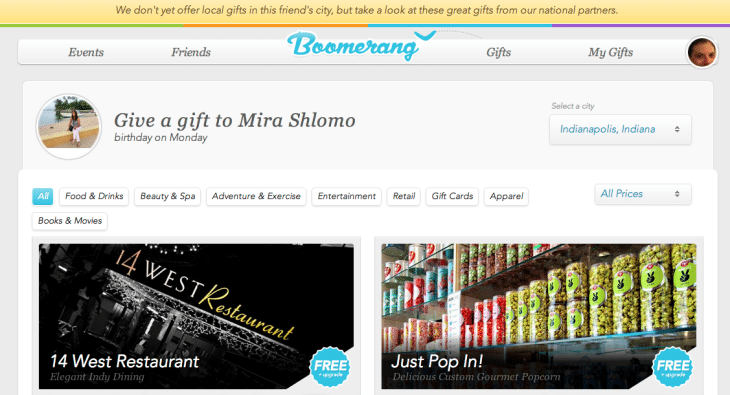Skift Take
Gtrot is out of "travel" now, joining the ranks of social travel sites that have gone looking in vain for both a revenue model and users.
Social-travel darling Gtrot shifted into “local discovery” in April, but now has morphed into gift-voucher site Boomerang, in the hope that it has finally found a way to make some money.
And, before soft-launching Boomerang in August, Gtrot backer Lightbank “doubled down” on its initial investment of $1 million in Gtrot, bringing Boomerang’s total funding to “under $2 million,” says Zach Smith, Boomerang founder and CEO.
Gtrot, enlisting social network friends in trip-planning, had launched in March 2011 with co-founders Smith and Brittany Laughlin running the show. Boomerang is the same corporate entity that launched Gtrot.
Gtrot had received an enthusiastic reception from the travel technorati, picking up top honors in the social media category at the 2011 Travel Innovation Summit.
But then Gtrot lost its bearings, just like most of its social-travel startup peers.
The company revealed its latest metamorphosis to users yesterday, under the headline, “Gtrot is now Boomerang, and we’ve got a gift for you!”
Smith told Skift that Gtrot’s shift from social travel into local discovery in April 2012 was a “no-brainer” as travelers also sought to find things to do in their home cities, and that transition “exponentially increased the number of use cases.”
But, with 30,000 to 50,000 monthly active users, Gtrot still searched in vain for a revenue model, Smith says, adding “that is where we struggled.”
It became clear that the company needed to conduct e-commerce on its own site, he says.
Citing the roughly $2 in revenue per user that companies such as Yelp and Foursquare take in, Smith notes “that’s minuscule compared to an e-commerce site actively driving transactions.”
Gtrot had begun integrating gift card offers from local businesses, and found some virality to the proposition, Smith says. “That’s how we landed in local gift-giving,” Smith says.
Boomerang currently enables users to buy their friends massages, doughnuts and jeans as local gifts for birthdays or other occasions in Chicago, New York, Austin, and Indianapolis, and runs national offers, as well.
Smith isn’t ready to dismiss social travel as a viable business, arguing it’s “definitely possible” to succeed.
“I’m not saying there is not a model our there,” Smith says. “We just stumbled on one in the gift space and found one more compelling for us.”
That’s a very social — and polite — thing to say.
The Daily Newsletter
Our daily coverage of the global travel industry. Written by editors and analysts from across Skift’s brands.
Have a confidential tip for Skift? Get in touch
Tags: social media
